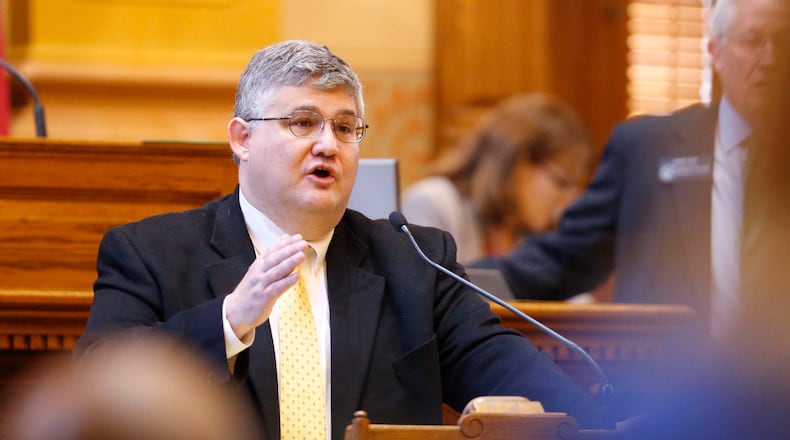Savannah – Republican activists elected David Shafer as chairman of the Georgia GOP on Saturday, capping a political comeback for the former powerful state senator just months after he lost a bruising runoff for lieutenant governor.
The delegates gathered in Savannah for the party’s convention gave Shafer a wide victory over veteran Republican activist Scott Johnson, educator Mary Kay Bacallao and Bruce Azevedo, a real estate agent and former chair of the 9th District GOP.
The election to succeed John Watson, who didn’t stand for another term, puts Shafer in charge of the state GOP apparatus that will coordinate how the party will spend millions of dollars and chart out campaign strategy in the 2020 presidential race.
A former executive director of the state GOP, Shafer is well-known to many of the activists long before his run for the state’s No. 2 job. And his campaign pledge was focused on beefing up a “neglected” grassroots in dozens of counties that have no local GOP organizations.
“I believe our Republican Party is in trouble,” he said. “The last election we found ourselves on the defensive for the first time in a decade.”
His closest challenger was Johnson, a former Cobb GOP leader who argued the party needed to do a better job registering conservative voters and reaching out to young people, women and minorities flocking across the aisle.
Johnson opened his campaign speech with a flashy video recounting the near-miss by Democrats in the last election, and vowed the party would retire its debt of roughly $130,000 by September.
“Our party needs a chair who can beat the Democrats on the ground but can also raise the money to compete,” he said.
Johnson also had an important ally: Lt. Gov. Geoff Duncan, who narrowly bested Shafer in that bitter runoff last year. During that contest, Duncan frequently reminded voters that Shafer was accused, and cleared, of sexually harassing a lobbyist.
(A Senate ethics panel later concluded there was a "lack of credible evidence" to support the allegations, and his attorney called them "completely fabricated.")
While Gov. Brian Kemp and most other party leaders stayed neutral, Duncan and his allies rallied behind Johnson. Duncan called Johnson the true outsider and his aides questioned Shafer’s ties to disgraced Insurance Commissioner Jim Beck, who faces federal fraud charges.
“David has been extremely gifted in a number of roles, but in my opinion he’s a divider,” Duncan said before the contest. “I see Scott as a uniter.”
It was a calculated risk. Gov. Nathan Deal was snubbed in 2011 when party activists rejected his handpicked candidate. And when Watson won in 2017, he became the first establishment-backed candidate elected chairman since Republicans won total control of the statehouse.
Shafer will inherit a fractious, but powerful, party that was stabilized by Watson after he was elected in 2017. Back then, the party was mired in a costly racial discrimination lawsuit, facing fundraising troubles and struggling with poor ties with elected officials.
As party chairman, Watson funneled millions of dollars into ads that boosted Kemp and assailed Democrat Abrams, and the party’s efforts helped lay the groundwork for the third consecutive GOP sweep of all statewide offices.
But the November results also exposed weaknesses in a party used to winning by comfortable margins. The biggest political shift came in the Atlanta suburbs, where Republican struggles nearly cost Kemp a victory and left Democrats with a sweep of new seats.
Shafer said he would reverse that trend by reviving more confrontational tactics that Republicans used when they were in the minority decades ago.
“We need to go back on the offensive,” he said.
About the Author
Keep Reading
The Latest
Featured



